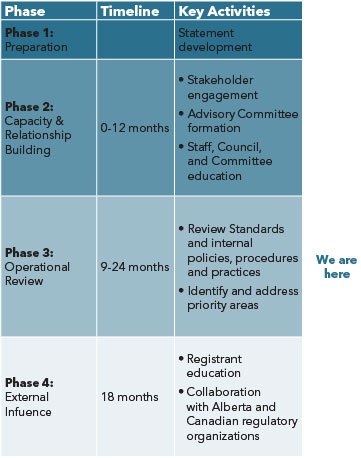The College of Physiotherapists of Alberta’s Statement Regarding Discrimination, Oppression and Inequity
Structures and systems of inequity exist in Canada which result in oppression and marginalization experienced by many individuals. These structures and systems perpetuate discrimination on the basis of identity factors including age; gender identity and expression; physical attributes, abilities and body size; sex and sexual orientation; race and ethnicity.
As a leader in health profession regulation, the College of Physiotherapists of Alberta has a duty to address discrimination and identify and deconstruct structures and systems of inequity, with the goal of fostering equity, diversity and inclusion within the health-care system and society at large. However, we also recognize that we are not experts on this topic.
The College of Physiotherapists of Alberta acknowledges:
- The existence of inequity and discrimination in Canadian society, based on multiple identity factors.
- Many people experience discrimination daily.
- Colonialism and its effects on Indigenous communities are distinct from other forms of discrimination, and that the consequences of colonialism and the residential school system require particular attention.
- An individual’s unique combination of identity factors can affect their experience of discrimination, oppression and marginalization.
- The oppression and marginalization that result from all forms of discrimination have a profoundly negative affect on health and wellbeing.
- Discrimination also negatively affects physiotherapists working within the health system.
The College of Physiotherapists of Alberta also acknowledges that:
- We have been slow to comment on this pervasive problem.
- Silence perpetuates the problem and is harmful.
- Statements unaccompanied by action are meaningless and damaging.
Recent high-profile cases of racism in the Canadian health system have served as a catalyst and focal point for action. The College has spent the last several months reflecting on our role in addressing the countless incidents of discrimination and underlying implicit and explicit biases experienced daily by members of historically marginalized communities.
We now commit to:
- Centering the voices and perspectives of members of historically marginalized communities to guide the College in identifying priorities for action to address discrimination and inequity.
- Further educating College staff, Council and volunteers on the issues of discrimination, marginalization and oppression, with a focus on racism and its intersection with other identity factors, and how these factors affect an individual’s health and wellbeing.
- Critically reviewing our policies, procedures, practices, and standards from an anti-discrimination, anti-oppression lens.
- Educating and engaging regulated members of the College in discussions about inequity, discrimination, intersectionality, oppression, and marginalization.
- Contributing to ongoing discussions about discrimination oppression, and marginalization within the broader health-care community, health profession regulation community, and society at large; seeking to make meaningful change within the communities where we have influence.
- Refining our approach and actions as we learn from members of historically marginalized communities engaged with us in work to address discrimination and inequity.

We believe that we are all better off when equity, diversity and inclusion characterize our relationships and interactions with each other.
We recognize that this is an ongoing process and that we might make missteps along the way. We are seeking people to collaborate and help guide us in our work. If you are interested in contributing, please contact info@cpta.ab.ca.
Glossary
Anti-racism: A form of action against racism and the systemic racism and the oppression of marginalized groups. Being antiracist is based on the conscious efforts and actions to provide equitable opportunities for all people on an individual and systemic level. As stated by Ibram X. Kendi, the opposite of racist isn’t not racist, but rather it is antiracist.
Discrimination: The unjust or prejudicial treatment of different categories of people or things, for example on the grounds of race, age, sex or other identity factors.
Inequity: A lack of fairness or justice.
Intersectionality: The complex, cumulative way in which the effects of multiple forms of discrimination (such as racism, sexism, and classism) combine, overlap, or intersect especially in the experiences of marginalized individuals or groups.
Marginalization: Treatment of a person, group, or concept as insignificant or peripheral.
Oppression: Prolonged cruel or unjust treatment or control.




